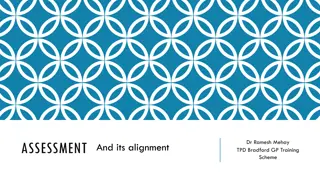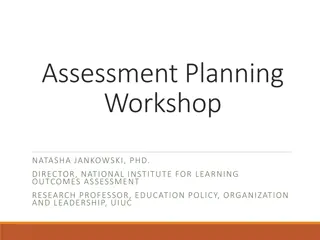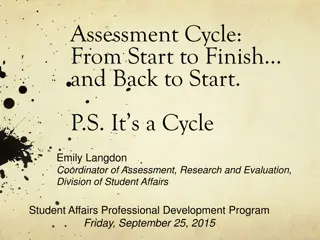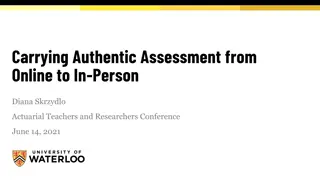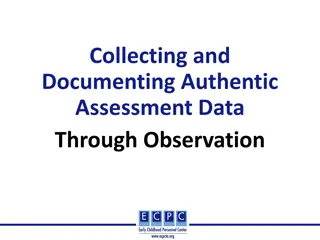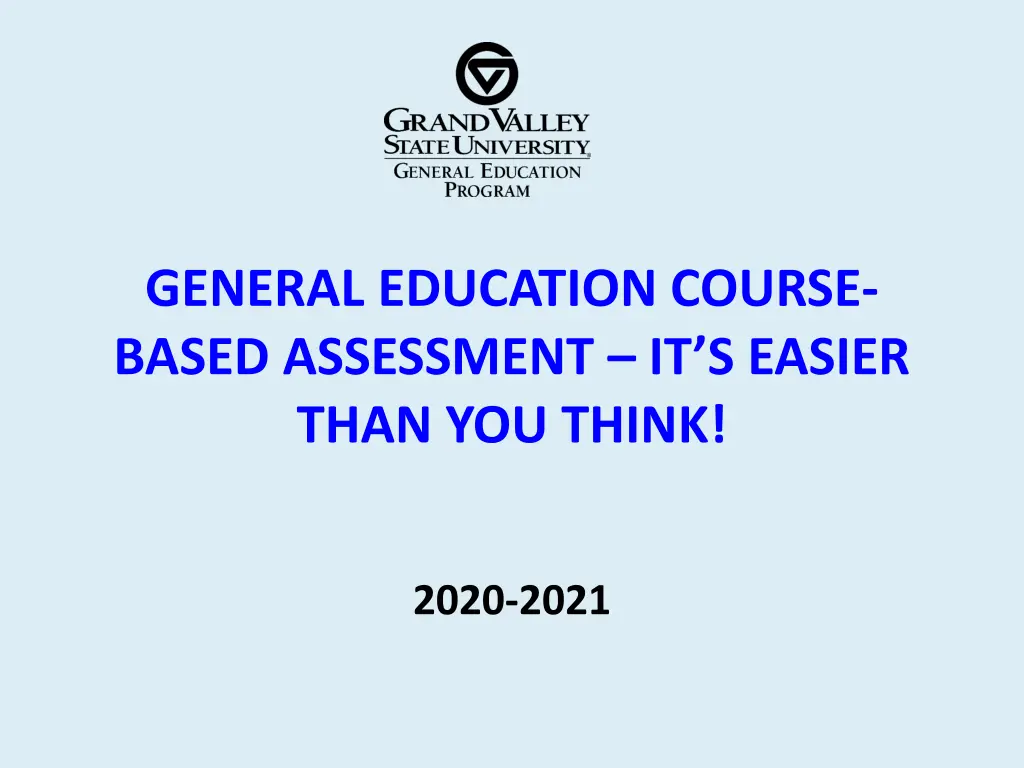
Assessment Strategies for General Education Courses
Discover effective assessment strategies for general education courses to enhance student learning outcomes. Learn how to teach, assess, report, and revise course content efficiently. Utilize new models for skills and knowledge assessment, along with valuable tips for measurement and evaluation.
Uploaded on | 0 Views
Download Presentation

Please find below an Image/Link to download the presentation.
The content on the website is provided AS IS for your information and personal use only. It may not be sold, licensed, or shared on other websites without obtaining consent from the author. If you encounter any issues during the download, it is possible that the publisher has removed the file from their server.
You are allowed to download the files provided on this website for personal or commercial use, subject to the condition that they are used lawfully. All files are the property of their respective owners.
The content on the website is provided AS IS for your information and personal use only. It may not be sold, licensed, or shared on other websites without obtaining consent from the author.
E N D
Presentation Transcript
GENERAL EDUCATION COURSE- BASED ASSESSMENT IT S EASIER THAN YOU THINK! 2020-2021
OVERVIEW Teach ALL of the knowledge and skills that we want our graduates to have Assess how well students learn it (every 4 years). You will only assess 1 Knowledge and 1 Skill SLO for this term (you can assess more if you want) Analyze and Report the results (CAR) Revise the course
3 CHANGES Definition of the skills have changed slightly Rubrics have changed dramatically Two new models: Skills = tree ring Knowledge = one exposure
TEACH, ASSESS, REPORT, REVISE Knowledge Student Learning Outcomes (SLOs) (1-3/class) AND Skills SLOs (2/class (may be 4 if the course double-dips)): Collaboration Critical Thinking Ethical Reasoning Information Literacy Integration Oral Communication Problem Solving Quantitative Literacy Written Communication
DO NOW 1. Which SLOs do I teach and assess? 2. What is the definition of the SLO? www.gvsu.edu/gened Click on the Assessment button.
DO NOW TEACH, ASSESS, REPORT, REVISE 3. How do I teach the SLOs? www.gvsu.edu/gened Click on the Assessment button.
TEACH, ASSESS,REPORT, REVISE Assessment measure = something you grade You can t use a grade to assign a rating (3 is not a B) because an exam assesses multiple items, many of which are too specific to assess the GE Knowledge SLOs. It is acceptable to use a test question if it is broad enough. Critical point One measure can be used to rate students for several SLOs but you must evaluate each SLO separately (students aren t likely to have identical ratings on all 4 objectives for a Skill SLO or for both Knowledge SLOs). To balance out the assessment workload you may find it is easier to assess different objectives using different measures at different times.
TEACH, ASSESS,REPORT, REVISE Assess towards the end of the term You MUST use the GE rubric to assign assessment ratings (1-4) No pre- and post-test needed You only have to measure student learning once for each SLO Share the assessment results with students so they know where they need to focus their efforts
TEACH, ASSESS, REPORT, REVISE Skills Rubric (see the specific skill rubric for more information) Tree ring model - Students have multiple exposures to the Skills SLOs; therefore, we do not anticipate students receiving a Level 4 rating after a single course (but we do anticipate it by graduation). Student Performance Levels 4 = Accomplished 3 = Satisfactory 2 = Progressing 1 = Emerging 0 = Below Emerging Blank = did not complete assignment, test, etc.
Rubric for a Skill SLO Student Ratings Objectives
TEACH, ASSESS, REPORT, REVISE Knowledge Rubric One exposure model: Students have only one or two exposures to the Knowledge SLO; therefore, the goal is for students to achieve Level 3 after a single course. A student regardless of major demonstrates: 4=advanced understanding 3=basic understanding 2=substantial progress toward a basic understanding 1=very limited understanding 0=no understanding Blank=did not complete assignment, test, etc.
TEACH, ASSESS, REPORT, REVISE DO NOW 4. How do I assess the SLOs? 5. Where do I enter my data? www.gvsu.edu/ gened. Click on the Assessment button.
TEACH, ASSESS, REPORT, REVISE Main Page of the Assessment Site Click here for your course and section
TEACH, ASSESS, REPORT, REVISE Export the spreadsheet or enter your data online
TEACH, ASSESS, REPORT, REVISE You will only assess 1 Knowledge SLO it has been assigned to you. If you are unsure which SLO you are assessing, please contact us. You will still see all SLOs in the Assessment Management System. Knowledge SLOs: These are broad (make sure the students see the forest for the trees). It is NOT the score on an exam or the course grade. Knowledge SLOs Enter a 1, 2, 3, 4 in every cell (or a blank if they did not submit it or 0 if they are below Level 1)
TEACH, ASSESS, REPORT, REVISE You will only assess 1 Skill SLO and all of the associated objectives it has been assigned to you. If you are unsure which SLO you are assessing, please contact us. You will still see all the SLOs in the Assessment Management System. Skills SLOs: Enter a rating for each objective for each SLO (there are 3-5 objectives for each SLO). (This course double-dips so it has 4 Skills). Objectives for 1 Skill Enter a 1, 2, 3, 4 (or a blank if they did not submit, or 0 if they are below 1) in every cell.
TEACH, ASSESS, REPORT, REVISE DO TOWARDS THE END OF THE SEMESTER 6. Enter assessment data online Submit data by December 28. We ll email you tables and figures of your results. www.gvsu.edu/gened. Click on the Assessment button.
TEACH, ASSESS, REPORT, REVISE In the CAR, describe: How you taught the SLOs How you assessed the SLOs 7. What you learned Complete the CAR (Course Assessment Report) How you plan to revise the course (teaching and/or assessing) Write 1 CAR jointly for all sections that collected data Submit the CAR by January 18. Email CAR to: gened@gvsu.edu
TEACH, ASSESS, REPORT, REVISE GEC will review your report and send you comments. Next time you teach the course, revise how you teach and/or assess the course based on what you learned and GEC s feedback on your report !! Call if you have questions!!







